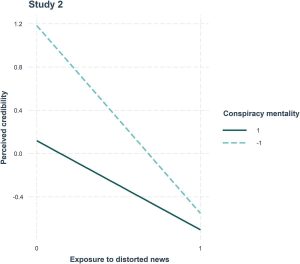Study: Even a single distorted news item can influence susceptible peoples’ opinion formation about political candidates
Distorted news about political candidates also circulated in the current Bundestag election campaign. Especially about the candidate of the Green Party, Annalena Baerbock, a variety of false reports and distorted representations circulated (see here). A series of experiments shows that even reading a single distorted article instead of a traditional journalistic contribution can lead to a more negative evaluation of previously unknown political candidates. This effect is most pronounced among people with a stronger affinity for authority and conspiracy narratives. People without these characteristics seem to be less impressionable. But even among these people, opinion formation suffers when journalistic information is lacking. However, voting intentions themselves are not directly influenced by this. Researchers from the University of Münster came to these conclusions based on a series of experiments with a total of 1,024 participants, which were published in the journal Social Influence on 4 October 2021.
Background information on the study
Under the direction of Dr. Lena Frischlich, communication scientists and psychologists from the Westfälische Wilhelms-Universität Münster (WWU), together with former students, investigated the perception and effect of distorted news on the formation of political opinion in three experimental studies. In each study, the participants read either a distorted news report or a traditional journalistic text about a previously unknown political candidate of the Greens or the CDU. The participants then rated the credibility of the article and the candidate himself. In addition, the participants reported their voting intentions.
Central results
The distorted news was consistently rated as less credible than the journalistic contributions. “This is certainly gratifying for journalism, but should not be too reassuring, since some people did believe the distorted news,” explains Dr. Jens Hellmann, the study’s second author.

Particularly important for the democratic process: those who read the distorted news subsequently judged the political candidate more negatively and less trustworthily than those participants who could inform themselves from journalistic articles. Again, this was especially true for those with more pronounced allegiance to authority and stronger approval of conspiracy narratives. However, people without these characteristics also rated the candidate more negatively if they had read a biased article rather than a journalistic one. “We suspect,” says Dr. Lena Frischlich, the study’s lead author, “that the biased article simply did not provide these individuals with enough information to form an informed opinion in the first place.”
“In summary, our results show that the effect of biased news on democratic decisions must also be considered in the context of journalistic reporting,” says Lena Frischlich. “Biased news unfolds its full effect primarily on certain individuals. But we all need access to trustworthy information in order to form an informed opinion about political candidates,” Frischlich continues. However, the distorted news had no direct influence on voting intentions.